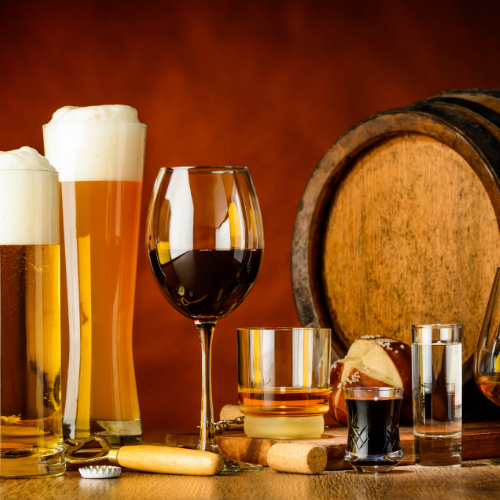How Alcohol Affects Body Composition

Is it really possible to enjoy your social drinking and maintain a healthy body composition? The answer may surprise you. We know many use alcohol as a way to relax at night or loosen up at parties, events and especially after a long week at work. But how much of an effect does it really have on your waist line? Several studies have shown that there is a connection to weight gain and alcohol consumption due to the amount of calories in alcoholic beverages, but how much alcohol one is consuming, the kind of alcoholic beverages and what the person eats while drinking all factor into it.
How the body metabolizes food and alcohol
When food breaks down within the body, it is a little different from when alcohol breaks down in the body. When food is broken down, it breaks down into carbohydrates, fats and proteins. In the process of the body breaking down carbohydrates, insulin levels rise and cause fat oxidation to be suppressed. When these insulin levels drop the fat is released from fat cells and they metabolize. This dietary fat is only stored for a short time, this is because fat storage is happening on a continuous basis with fatty acids coming in and out of fat cells throughout the day. This short delay in fat oxidation is not what causes weight gain, it is the input and output of calories that are consumed in a day. Alcohol is usually made through fermenting a starch which is metabolized similar to a carbohydrate. The only difference between the metabolism of food and alcohol is that, the alcohol produces a by-product called microsomal ethanol-oxidizing system, this is a compound known as acetate which is toxic to the body. Our bodies natural defense is to remove this toxin from our body which is one of the reasons alcohol has such a high thermogenic effect. Both alcohol and food are known to suppress fat oxidation, but alcohol does not convert calories at higher rate into body fat anymore than the calories of protein, fat, or carbohydrates. One study attempted to estimate fat synthesis after alcohol consumption and found that only 3% of alcohol is converted into body fat. This study found that for every 24 grams of alcohol that was consumed, only 0.8 grams of fat was made in the liver. That's good news for those that think it's the alcohol that's making them gain weight. It's more likely what they eat and their workout routine that's the issue.
The Caloric Differences in Alcohol Beverages
People may not realize that are are different calorie amounts for different alcoholic beverages but there are. Light beers contain 100 calories and about 5 carbohydrates per serving. Regular beers contain 150 calories and 10.5 grams of carbohydrates per serving. IPA beers have 240 calories and 22 grams of carbohydrates per serving. Wines depending on kind can range to 110-150 calories and 2-4 grams of carbohydrates per serving. Spirits alcohol contains 95 calories and has zero carbohydrates. It is important to note that even though spirits are lower in calories and carbohydrates, if you were to add a high calorie beverage such as juice or soda the calories and carbohydrates will increase.
So, Can Alcohol Consumption Make you Gain Weight?
The answer is no, alcohol consumption cannot make you gain weight if you are drinking at a moderate rate. There are some ways where alcohol may cause an increase in eating and a decrease in exercising which could affect the input and output of calories, and then cause weight gain. It's been shown drinking prior to a meal causes an increase in caloric consumption. Drinking the night before you plan on exercising could have a negative impact on one's exercise routine which could affect the caloric output of excess calories. The most important thing to remember is as long as you keep your total caloric input and output under control, limit consuming sugary alcohol beverages, and drink moderately, then consuming alcohol will not make you gain excess weight. Want more proof? One study of 19,220 women found that normal-weight women who consumed a light to moderate amount of alcohol actually gained less weight than non-drinkers and had a lower risk of becoming overweight or obese during 12.9 years of follow-up. Get individualized help with your weight concerns. Schedule a free strategy here.

